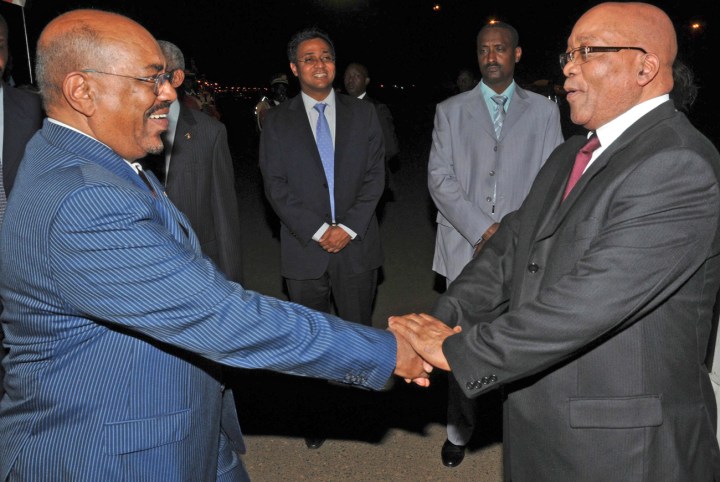Africa, Politics, South Africa
ANC and Sudan’s ruling party: a bad romance

A South African citizen has been kidnapped by the Sudanese army. Our government is outraged, but what of the ANC? Far from condemning the abduction, the ruling party is making nice with Sudan’s ruling party, promising to share its experience of democracy and “good governance”. SIMON ALLISON probes what Sudan’s ruling party – the fig leaf of a dictatorial regime – might share with the ANC.
It has been a tough few weeks for South Africans abroad. In Malaysia, a South African child was abducted in broad daylight as he walked to school. In Somalia, a South African security officer working for a mercenary company was shot dead, apparently by his bodyguard. And in the Sudans, somewhere in that badly defined border region between Sudan and South Sudan, a South African working with the United Nations clearing landmines was kidnapped, along with three of his colleagues, by the Sudanese military.
The situation in Sudan is of particular concern. Thabo Siave, the kidnap victim, was working for a mine-clearance company called Mechem, a subsidiary of Denel, South Africa’s state-owned arms producer. Incidentally, it’s a perfect business model – Denel sells the weapons, and Mechem is paid to clean them up. In this instance, Mechem had been sub-contracted to the UN, which gives Siave and his colleagues diplomatic immunity (not that this is helping them).
His kidnapping did not go unnoticed by our department of international relations (Dirco), which immediately began working to secure his release. “Our ambassador is speaking to the [Sudanese] authorities. We are offering consular assistance to him,” said spokesman Clayson Monyela, whose department is investigating the circumstances of the abduction.
While all this was going on, unbeknown to Dirco (or at least to Monyela, who when questioned said it was the first he’d heard of it), the African National Congress was also engaging with its Sudanese counterparts. But the tenor of their discussions was rather different. No condemnation of Sudan’s aggression against a South African national was forthcoming. In fact, the incident wasn’t even mentioned in the press release accompanying the meetings between Gwede Mantashe and the secretary general of Sudan’s National Congress Party (NCP) – the one party of Sudan’s de facto one-party state, and the political base from which war crimes-accused President Omar al-Bashir has run his country for over two decades.
Instead, we were told of a “historic development” between South Africa and Sudan (referred to erroneously throughout the press release as “North Sudan”): the signing of a memorandum of understanding to govern the relationship between the ANC and the NCP, which is the “culmination” of the ANC’s efforts to build a “solidarity platform” (whatever that may be) with the NCP.
“The essence of the agreement is to formalise party-to-party relations, promote good governance and sharing of experience, deepening democracy, mutual assistance in the policy development space and fast-tracking of continental development and integration,” said the press release.
Keith Khoza, spokesman for the ANC, interrupted his public holiday on Tuesday to say that for the ANC the lessons are likely to be taught rather than learnt. He spoke of using different measures of persuasion to help reform the government in Sudan, one of which was party-to-party dialogue. He spoke of “exposing them to the South African perspective”, and how the ANC believes that “if [the NCP] were as democratic as we were” then it might go some way to alleviating Sudan’s problems.
But from a South African perspective, the big question is what exactly the ANC hopes to learn from the NCP, the ruling party in a brutal, murderous dictatorial regime? Khoza sidestepped this question: “We will determine that after initial contact between the working groups,” he said.
The NCP certainly does have things to offer, if the ANC is so inclined; but they are lessons we should all hope our ruling party doesn’t learn from Sudan’s: how to silence opposition, how to entrench a cult of personality and how to merge the boundaries between state and party until they are effectively one and the same.
In the meantime, Thabo Siave remains a captive of the Sudanese government. One wonders what he would think if he knew that far from fighting for his release, the ANC was distancing itself from his case – “Dirco is investigating,” said Khoza when pressed – and making nice with Sudan’s ruling party. DM
Read more:
- South African UN worker held in Sudan on TimesLIVE.
Photo: Sudan’s President Omar Hassan al-Bashir (L) welcomes South Africa’s President Jacob Zuma in Khartoum on 8 July 2011. REUTERS/Stringer.



















 Become an Insider
Become an Insider